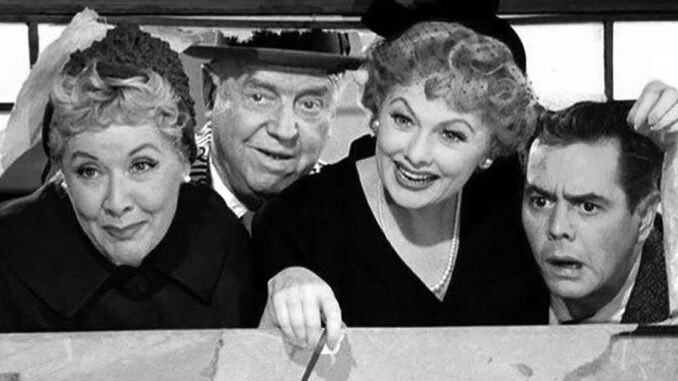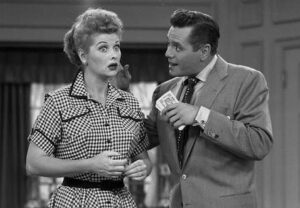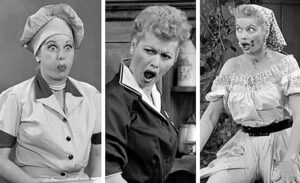
The Iconic Show That Redefined Television
“I Love Lucy” isn’t just a sitcom—it’s a cornerstone of modern entertainment. Launched in 1951, this legendary show starring Lucille Ball and Desi Arnaz brought groundbreaking innovations, unforgettable humor, and cultural shifts that resonate even today. Let’s dive into how this media marvel came to be and explore its lasting legacy.
The Birth of “I Love Lucy”
How Lucille Ball and Desi Arnaz Created TV History
Lucille Ball was already a rising star in radio with My Favorite Husband, but her insistence on working with her real-life husband, Desi Arnaz, gave birth to the idea of “I Love Lucy.” CBS executives were skeptical about casting Arnaz due to his Cuban heritage, but their eventual agreement led to one of the most successful partnerships in entertainment history.
The Pilot Episode Gamble
To prove skeptics wrong, Ball and Arnaz self-funded the pilot episode. Their chemistry, comedic timing, and innovative approach were undeniable, prompting CBS to greenlight the series. This bold move highlighted their commitment to authenticity—a theme that defined the show.
Why “I Love Lucy” Was a Game-Changer
Filming in Front of a Live Audience
“I Love Lucy” pioneered the use of a multi-camera setup filmed before a live studio audience. The laughter wasn’t canned; it was real, creating an electric atmosphere that enhanced the viewing experience.
Syndication: A Financial Masterstroke
Desi Arnaz’s business acumen led to the show being filmed on high-quality 35mm film, allowing for future syndication. This decision not only preserved the show’s quality but also made it the first sitcom to achieve global popularity through reruns.

Groundbreaking Storylines and Representation
Interracial Marriage on Screen
At a time when interracial relationships were rarely depicted, “I Love Lucy” fearlessly showcased the love and partnership between Lucy and Ricky Ricardo, breaking barriers and challenging societal norms.
A Woman Leading the Comedy Genre
Lucille Ball’s portrayal of Lucy Ricardo gave women a comedic voice rarely seen before. She wasn’t just the sidekick; she was the star, proving that women could carry a show while delivering slapstick comedy with unmatched brilliance.
The Genius of Physical Comedy
Memorable Moments That Defined the Genre
From Lucy stomping grapes in a wine vat to her frantic assembly-line scene at a chocolate factory, Ball’s physical comedy is iconic. These scenes weren’t just funny—they were masterclasses in timing, expression, and creativity.
The Role of Innovation in “I Love Lucy”
The Birth of the Sitcom Format
The structure of “I Love Lucy”—episodic adventures with recurring characters and relatable situations—became the gold standard for sitcoms. Shows like “Friends” and “The Office” owe their format to this trailblazer.
The First Show to Address Pregnancy
In a bold move, “I Love Lucy” depicted Lucy’s pregnancy on-screen, aligning with Ball’s real-life expectancy. This moment shattered taboos and normalized discussing family life on television.
The Business Empire Behind the Show
Desilu Productions: Changing the Industry
Lucille Ball and Desi Arnaz’s production company, Desilu, didn’t just produce “I Love Lucy”—it became a powerhouse, paving the way for series like Star Trek and Mission: Impossible.
Pioneers of Ownership
The duo’s decision to retain ownership rights of their show was groundbreaking, setting a precedent for creative control and profit-sharing in Hollywood.

The Cultural Impact of “I Love Lucy”
A Legacy That Endures
“I Love Lucy” remains relevant decades after its final episode aired. From its influence on fashion (hello, polka dots!) to its universal humor, the show continues to captivate audiences across generations.
Celebrated Around the World
Translated into dozens of languages, “I Love Lucy” transcended cultural barriers, proving that laughter truly is universal.
Behind the Scenes: Lesser-Known Facts
Lucille Ball’s Reluctance
Initially hesitant to commit to television, Ball worried it would limit her movie career. Ironically, the show elevated her to a level of fame she could never have imagined.
The Power Couple’s Real-Life Struggles
Behind the laughter, Ball and Arnaz faced marital challenges that eventually led to their divorce. Despite this, their professional partnership remained legendary.
Why “I Love Lucy” Matters Today
Inspiring Future Generations
Without “I Love Lucy,” the sitcom landscape would look vastly different. Stars like Tina Fey and Carol Burnett credit Lucille Ball as their inspiration.
Proof of Timeless Storytelling
The themes of love, ambition, and the hilarity of everyday mishaps keep the show timeless, proving that good storytelling never goes out of style.
Conclusion
“I Love Lucy” wasn’t just a TV show; it was a revolution. From its innovative production techniques to its fearless storytelling, it reshaped the media landscape and cemented its place in history. Lucy and Ricky Ricardo’s antics may have ended on-screen, but their legacy lives on, continuing to bring joy and laughter to millions around the world.
FAQs
1. Why was “I Love Lucy” so innovative?
The show introduced groundbreaking techniques like the multi-camera format, live audience reactions, and high-quality filming for syndication.
2. How did Lucille Ball and Desi Arnaz balance their real-life and on-screen relationship?
While they faced personal challenges, their professional chemistry and dedication to the show remained unparalleled.
3. What made Lucille Ball a comedy icon?
Her impeccable timing, fearless physical comedy, and ability to connect with audiences made her a trailblazer in the genre.
4. How did “I Love Lucy” influence future TV shows?
Its format, storytelling style, and production techniques became the blueprint for modern sitcoms.
5. Is “I Love Lucy” still popular today?
Absolutely! Its universal humor, relatable themes, and iconic performances ensure its enduring appeal across generations.